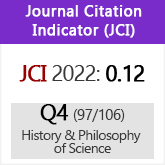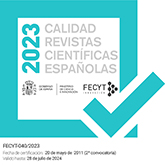La agenda naturalista de las pasiones en la filosofía de la modernidad temprana
DOI:
https://doi.org/10.3989/asclepio.2018.09Palabras clave:
Naturalismo, Pasiones, Antropología naturalizada, Filosofía moderna tempranaResumen
En este artículo trataremos de caracterizar las principales razones teóricas del cambio de perspectiva del escolasticismo a la filosofía de la modernidad temprana en lo concerniente al estudio de las facultades cognitivas y emotivas. Para lograr nuestro objetivo, sintetizaremos el contexto intelectual del estudio de las pasiones; después, distinguiremos dos grandes corrientes del pensamiento naturalista: en primer lugar, la tesis reduccionista que fue adoptada, entre otros, por Thomas Hobbes, Pierre Gassendi y René Descartes; en segundo lugar, el proyecto de establecer y describir la “dinámica de la vida mental” que fue desarrollado por Thomas Hobbes, John Locke y David Hume. Al dar cuenta de esto, esperamos también obtener una comprensión más clara sobre los cambios de perspectiva que fueron propuestos por algunos filósofos de la modernidad temprana, cuyas ideas avanzaron hacia la naturalización de la antropología filosófica.
Descargas
Citas
Al-Farabi (1995), La ciudad ideal, Madrid, Tecnos.
Anstey, Peter (2000), "'De Anima' and Descartes: Making up Aristotle's Mind", History of Philosophy Quarterly, 17 (3), pp. 237-260.
Anstey, Peter (2002), "Locke, Bacon and Natural History", Early Science and Medicine, 7 (1), pp. 65-92. https://doi.org/10.1163/157338202X00036
Aristóteles (2000), Acerca del alma, Madrid, Editorial Gredos.
Aristóteles (2002), Retórica, Ciudad de México, Universidad Nacional Autónoma de México.
Averroes (2004), Sobre el intelecto, Madrid, Editorial Trotta.
Avicena (Ibn Sina) (2005), "On the Soul". En: Khalidi, Muhammad Ali (ed.), Medieval Islamic Philosophical Writings, Nueva York, Cambridge University Press, pp. 27-58.
Bartra, Roger (2001), Cultura y melancolía. Las enfermedades del alma en la España del Siglo de Oro, Barcelona, Editorial Anagrama. PMCid:PMC59585
Black, Deborah L. (2005), "Psychology: soul and intellect". En: Adamson, Peter, y Taylor, Richard C. (eds.), The Cambridge Companion to Arabic Philosophy, Nueva York, Cambridge University Press, pp. 308-326.
Black, Deborah L. (2014), "The nature of Intellect". En: Pasnau, Robert (ed.), The Cambridge Companion to Medieval Philosophy, vol. 1, Nueva York, Cambridge University Press, pp. 320-333. https://doi.org/10.1017/CHO9781107446953.029
Bloch, O. René (1971), La philosophie de Gassendi, Países Bajos, Martinus Nijhoff.
Boros, Gábor (2006), "Seventeeth-Century theories of emotion and their contemporary relevance", European Journal of Analytic Philosophy, 2 (1), pp. 125-142, [en línea], disponible en: https://www.ffri.hr/phil/casopis/content/volume_2/ eujap3_boros.pdf [consultado el 30/5/2017]
Burton, Robert (2001), The Anatomy of Melancholy (1621), Nueva York, New York Review Books.
Byers, Sarah (2006), "Life as 'Self-Motion': Descartes and 'The Aristotelians' on the Soul as Life of the Body", The Review of Metaphysics, 59 (4), pp. 723-755.
Conrad, Lawrence I. (1995), "The Arab-Islamic medical tradition". En: Conrad, Lawrence I.; Neve, Michael; Nutton, Vivian; Porter, Roy; Wear, Andrew, The Western Medical Tradition. 800 BC to AD 1800, Nueva York, Cambridge University Press, pp. 93-138. PMid:7553911
Cook, Harold J. (1990), "The New Philosophy and medicine in Seventeenth-Century England". En: Lindberg, David C.; Westman, Robert S. (eds.), Reappraisals of the Scientific Revolution, Nueva York, Cambridge University Press, pp. 397-436.
Cook, Harold J. (2002), "Body and Passions: Materialism and the Early Modern State", Osiris, 17, pp. 25-48. https://doi.org/10.1086/649358
Cottegnies, Line (2002), "Codifying the Passions in the Classical Age: a few reflections on Charles Le Brun's scheme and its influence in France and in England", Études Épistémè, 1, pp. 141-158, [en línea], disponible en: http://www. etudes-episteme.org/2e/spip.php?article12 [consultado el 19/3/2016].
Cummings, Brian y Sierhuis, Freya (eds.) (2013), Passions and Subjectivity in Early Modern Culture, Burlington, Ashgate.
Cyrano de Bergerac (1993), Voyage dans la Lune, París, GF Flammarion.
Cyrano de Bergerac (2003), Les États et Empires du Soleil (1662), París, GF Flammarion.
Damasio, Antonio (1997), El error de Descartes: la razón de las emociones, Santiago de Chile, Andrés Bello.
Davidson, Herbert (1992), Alfarabi, Avicenna, and Averroes on Intellect. Their Cosmologies, Theories of the Active Intellect and Theories of Human Intellect, Nueva York, Oxford University Press.
Descartes, René (1997), Las pasiones del alma, Madrid, Tecnos. PMCid:PMC1051002
Descartes, René (2000), OEuvres de Descartes, edición Charles Adam y Paul Tannery, París, J. Vrin.
Diderot, Denis (1992), El sue-o de D'Alembert (1769), Madrid, Debate.
Duchesneau, François (1973), L'empirisme de Locke, La Haya, Martinus Nijhoff. PMid:4711643
Elmer, Peter (1989), "Medicine, religion and the puritan revolution". En: French, Roger; Wear, Andrew (eds.), The Medical Revolution of the Seventeenth Century, Nueva York, Cambridge University Press, pp. 10-45. https://doi.org/10.1017/CBO9780511897078.002
Frede, Michael (1987), "On Galen's Epistemology". En: Frede, Michael, Essays in Ancient Philosophy, Mineápolis, University of Minessota Press, pp. 279-298.
Galeno (2002a), "Que el mejor médico es también filósofo". En: Tratados filosóficos y autobiográficos, Madrid, Editorial Gredos, pp. 81-92.
Galeno (2002b), "Sobre mis propias opiniones". En: Tratados filosóficos y autobiográficos, trad. Teresa M. Manzano, Madrid, Editorial Gredos, pp. 321-357.
Galeno (2003), Sobre las facultades naturales/ Las facultades del alma siguen los temperamentos del cuerpo, Madrid, Editorial Gredos.
Gassendi, Pierre (1959), Exercitationes Paradoxicæ Adversus Aristoteleos (1624)/ Dissertations en forme de paradoxes contre les aristotéliciens, Livres I y II, París, J. Vrin.
Gassendi, Pierre (1964), Disquisitio metaphysica seu dubitationes et instantiae adversus Renati Cartesii metaphysicam et responsa (1644)/ Recherches métaphysiques, ou doutes et instances contre la métaphysique de R. Descartes et ses réponses, París, J. Vrin.
Gert, Bernard (1996), "Hobbes's Psychology". En: Sorell, T. (ed.), The Cambridge Companion to Hobbes, Nueva York, Cambridge University Press, pp. 157-174. https://doi.org/10.1017/CCOL0521410193.008
Hasse, Nikolaus (2014), "The soul's faculties". En: Pasnau, Robert (ed.), The Cambridge Companion to Medieval Philosophy, vol. 1, Nueva York, Cambridge University Press, pp. 305-319. https://doi.org/10.1017/CHO9781107446953.028
Hatfield, Gary (1998), "The Cognitive Faculties". En: Garber, Daniel; Ayers, Michael (eds.), The Cambridge History of Seventeenth-Century Philosophy, vol. 2, Nueva York, Cambridge University Press, pp. 953-1002.
Hatfield, Gary (2009), "Psychology in Philosophy: Historical Perspectives". En: Heinämaa, Sara; Reuter, Marina (eds.), Psychology and Philosophy. Inquiries into the Soul from Late Scholasticism to Contemporary Thought, Dordrecht, Springer, pp. 1-25.
Hatfield, Gary (2012), "Mechanizing the Sensitive Soul". En: Manning, Gideon (ed.), Matter and Form in Early Modern Science and Philosophy, Leiden, Brill, pp. 151-186. https://doi.org/10.1163/9789004221147_007
Henry, John (1989), "The matter of souls: medical theory and theology in seventeenth-century England". En: French, Roger; Wear, Andrew (eds.), The Medical Revolution of the Seventeenth Century, Nueva York, Cambridge University Press, pp. 87-113. https://doi.org/10.1017/CBO9780511897078.004
Hobbes, Thomas (1997), Leviathan (1651), Nueva York, Cambridge University Press.
Hobbes, Thomas (2000), Tratado sobre el cuerpo (1655), Madrid, Trotta.
Hume, David (2000), A Treatise of Human Nature (1739), editado por D. F. Norton y M. J. Norton, Oxford, Oxford University Press.
Isidoro de Sevilla (2004), Etimologías, Madrid, Biblioteca de Autores Cristianos.
Kemp, Simon, y Fletcher, Garth (1993), "The Medieval Theory of Inner Senses", The American Journal of Psychology, 106 (4), pp. 559-576. https://doi.org/10.2307/1422969
La Mettrie, Julien Offray de (2005), El discurso sobre la felicidad (1748), Buenos Aires, Cuenco de Plata.
La Mettrie, Julien Offray de (2014), El hombre Máquina (1747), El hombre Planta y otros escritos, Buenos Aires, Cuenco de Plata.
Le Brun, Charles (1982), Méthode pour apprendre à dessiner les passions proposée dans une conférence sur l'expression générale et particulière (1702), Nueva York, Reimp. Georg Olms.
LeCoat, Gerard (1971), "Comparative Aspects of the Theory of Expressions in the Baroque Age", Eighteenth-Century Studies, 5 (2), pp. 207-223. https://doi.org/10.2307/2737918
Locke, John (1979), An Essay Concerning Human Understanding (1690), Nueva York, Oxford University Press.
Mandeville, Bernard (2001), La fábula de las abejas (1729), Ciudad de México, Fondo de Cultura Económica. PMCid:PMC60128
Manning, Gideon (2008), "Naturalism and Un-Naturalism Among the Cartesian Physicians", Inquiry, 51 (5), pp. 441-463. https://doi.org/10.1080/00201740802421295
Michael, F. y Michael, E. (1990), "The Theory of Ideas in Gassendi and Locke", Journal of the History of Ideas, 51 (3), pp. 379-399. https://doi.org/10.2307/2709621
Norton, David (1981), "The Myth of British Empiricism". History of European Ideas, 1 (4), pp. 331-344. https://doi.org/10.1016/0191-6599(81)90026-7
Nutton, Vivian (1995), "Medicine in Late Antiquity and the Early Middle Ages". En: Conrad, Lawrence I.; Neve, Michael; Nutton, Vivian; Porter, Roy; Wear, Andrew, The Western Medical Tradition. 800 BC to AD 1800, Nueva York, Cambridge University Press, pp. 71-88.
Nutton, Vivian (2004), Ancient Medicine, Londres, Routledge. https://doi.org/10.4324/9780203490914
Paganini, Gianni (2002), "Hobbes et Gassendi: la psychologie dans le projet mécaniste", Kriterion, 106, pp. 20-41, [En línea] Disponible en: http://www.scielo.br/pdf/kr/v43n106/ v43n106a03.pdf
Panaccio, Claude (2014), "Mental Representation". En: Pasnau, Robert (ed.), The Cambridge Companion to Medieval Philosophy, vol.1, Nueva York, Cambridge University Press, pp. 346-356. https://doi.org/10.1017/CHO9781107446953.031
Panksepp, J y Biven, L. (2012), The Archeology of Mind. Neuroevolutionary Origins of Human Emotions, Nueva York, W. W. Norton.
Pintard, René (2000), Le libertinage érudit dans la première moité du XVIIe siècle, Ginebra, Éditions Slatkine. PMid:10648622 PMCid:PMC85287
Popkin, Richard (1980), The High Road to Pyrrhonism, Indianápolis, Hackett Publishing.
Popkin, Richard (2003), The History of Scepticism. From Savonarola to Bayle, Nueva York, Oxford University Press.
Sarasohn, Lisa T. (1996), Gassendi's Ethics. Freedom in a Mechanistic Universe, Nueva York, Cornell University Press.
Schmidt, Jeremy (2004), "Melancholy and the Therapeutic Language of Moral Philosophy in Seventeenth-Century Thought", Journal of the History of Ideas, 65 (4), pp. 583-601. https://doi.org/10.1353/jhi.2005.0020
Schmitter, Amy M. (2012), "Family Trees: Sympathy, Comparison, and the Proliferation of the Passions in Hume and his Predecessors". En: Pickavé, Martin, y Shapiro, Lisa (eds.), Emotion and Cognitive Life in Medieval and Early Modern Philosophy, Oxford, Oxford University Press, pp. 255-278. https://doi.org/10.1093/acprof:oso/9780199579914.003.0014
Sorell, Tom (1993), "Seventeenth-Century Materialism: Gassendi and Hobbes". En: Parkinson, G. H. R. (ed.), The Renaissance and Seventeenth-century Rationalism, Nueva York, Routledge, pp. 235-272.
Spinoza, Baruch (2007), Ética demostrada según el orden geométrico (1677), Madrid, Tecnos.
Thomson, Ann (2010), "Animals, Humans, Machines and Thinking Matter, 1690-1707", Early Science and Medicine, 15 (1- 2), pp. 3-37. https://doi.org/10.1163/138374210X12589831573027
Tomás de Aquino (2001a), "Cuestiones disputadas sobre el alma". En: Opúsculos y cuestiones selectas, volumen I, Madrid, Biblioteca de Autores Cristianos, pp. 397-668.
Tomás de Aquino (2001b), Suma de Teología, Tomo I, Madrid, Biblioteca de Autores Cristianos. PMid:11686184
Waldow, Anik (2010), "Empiricism and Its Roots in the Ancient Medical Tradition". En: Wolfe, Charles T., y Gal, Ofer (eds.), The Body as Object and Instrument of Knowledge. Embodied Empiricism in Early Modern Science, Dordrecht, Springer, pp. 287-308. https://doi.org/10.1007/978-90-481-3686-5_14
Wear, Andrew (1995), "Medicine in Early Modern Europe, 1500-1700". En: Conrad, Lawrence I.; Neve, Michael; Nutton, Vivian; Porter, Roy; Wear, Andrew, The Western Medical Tradition. 800 BC to AD 1800, Nueva York, Cambridge University Press, pp. 215-361.
Wilson, Catherine (2010), "Matter, Mortality, and the Changing Ideal of Science". En: Sorell, Tom; Rogers, G.A.; Kraye, Jill (eds.), Scientia in Early Modern Philosophy. Seventeenth- Century Thinkers on Demonstrative Knowledge from First Principles, Nueva York, Springer, pp. 35-51. https://doi.org/10.1007/978-90-481-3077-1_3
Wolfe, Charles T. (2010), "Empiricist Heresies in Early Modern Medical Thought". En: Wolfe, Charles T.; Gal, Ofer (eds.), The Body as Object and Instrument of Knowledge. Embodied Empiricism in Early Modern Science, Dordrecht, Springer, pp. 333-344. https://doi.org/10.1007/978-90-481-3686-5_16
Wright, John P. (1991), "Locke, Willis, and the Seventeenth-century Epicurean Soul". En: Osler, Margaret J. (ed.), Atoms, Pneuma, and Tranquillity. Epicurean and Stoic Themes in European Thought, Nueva York, Cambridge University Press, pp. 239-258. https://doi.org/10.1017/CBO9780511608353.013
Publicado
Cómo citar
Número
Sección
Licencia
Derechos de autor 2018 Consejo Superior de Investigaciones Científicas (CSIC)

Esta obra está bajo una licencia internacional Creative Commons Atribución 4.0.
© CSIC. Los originales publicados en las ediciones impresa y electrónica de esta Revista son propiedad del Consejo Superior de Investigaciones Científicas, siendo necesario citar la procedencia en cualquier reproducción parcial o total.Salvo indicación contraria, todos los contenidos de la edición electrónica se distribuyen bajo una licencia de uso y distribución “Creative Commons Reconocimiento 4.0 Internacional ” (CC BY 4.0). Puede consultar desde aquí la versión informativa y el texto legal de la licencia. Esta circunstancia ha de hacerse constar expresamente de esta forma cuando sea necesario.
No se autoriza el depósito en repositorios, páginas web personales o similares de cualquier otra versión distinta a la publicada por el editor.















